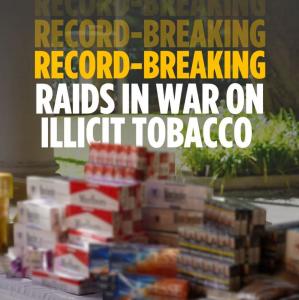Combating Illicit Trade in Tobacco Through Digital Innovation
Combating Illicit Trade in Tobacco Through Digital Innovation
The UK and the EU have emerged as global leaders in combating illicit tobacco trade through the implementation of advanced digital Track & Trace systems. These systems represent a significant shift from traditional supply chain control methods, which are often resource-intensive and yield diminishing returns. By leveraging cutting-edge technologies, the UK and EU have demonstrated how data-driven solutions can disrupt illicit markets, protect public health, and safeguard government revenues.
The EU’s Track & Trace system, established under the Tobacco Products Directive (TPD) 2014/40/EU, is the world’s largest tobacco traceability platform. This system applies digital tracking across the entire EU tobacco supply chain, enabling governments to identify irregularities and pinpoint when products are diverted into the illicit market. By providing real-time supply chain insights, the system allows authorities to conduct targeted inspections and disrupt illegal activities. Research by the European Commission’s Joint Research Centre (JRC) shows these systems provide a 94% precision rate under different metrics, offering high-quality information for law enforcement and helping to prevent illegal sales.
In 2022, the UK implemented its standalone Track & Trace system to combat illicit tobacco trade, which was costing the government an estimated £2.5 billion annually in lost tax revenue. Chief Constable Amanda Blakeman described it as a "game changer," noting that it "saves investigation time, provides crucial evidence for complex criminal cases, and disrupts established stolen goods markets." This system aligns with the UK government’s broader digital agenda, showcasing how data-driven governance can address complex challenges. By providing real-time visibility and analytics, it strengthens enforcement efforts and protects legitimate businesses from unfair competition.
The success of these systems has been made possible through collaboration with technology providers like Dentsu Tracking, which serves as the independent implementation partner for both the EU and UK. Their expertise in deploying advanced Track & Trace solutions enables governments to monitor and control the movement of regulated products, ensuring legal compliance and disrupting illicit trade networks.
Digital Track & Trace systems offer significant advantages over traditional methods, such as physical security stamps. These systems provide actionable intelligence, enabling governments to anticipate and respond to illicit activities more effectively. Unlike traditional approaches, they allow real-time monitoring of trade activities throughout the entire distribution chain, where smuggling often occurs. This is critical, as smuggling at the distribution level represents one of the most common forms of illicit tobacco trade. Automated data analytics reduce the resource burden on enforcement agencies, allowing them to focus on high-priority cases.
The EU has noted that these systems are essential for modern governance, delivering superior results while supporting legitimate businesses. By integrating advanced technologies such as digital validation and AI-driven analytics, governments foster a more secure and efficient marketplace. For example, a recent announcement in the Italian press highlighted how Dentsu Tracking’s EU tobacco traceability system enabled Italian authorities to dismantle illegitimate sales networks.
The success of the UK and EU systems demonstrates the importance of collaboration among governments, law enforcement agencies, and digital technology firms in combating the increasing sophistication of organized crime. Governments must continue to develop robust regulatory frameworks and invest in digital infrastructure across sectors where compliance is critical. Technology providers must innovate continuously to meet the evolving challenges of illicit trade.
The UK and EU’s success with Track & Trace systems highlights how innovative, data-driven approaches are transforming the fight against illicit trade. These systems align with modern digital governance agendas, providing governments with the tools to anticipate and disrupt illicit activities effectively. As more countries adopt similar technologies, the global community moves closer to eliminating illicit trade while fostering secure, transparent, and compliant supply chains in national and regional marketplaces.
The European Association for The Defense of Minorities
EADM
email us here
Visit us on social media:
Facebook
Legal Disclaimer:
EIN Presswire provides this news content "as is" without warranty of any kind. We do not accept any responsibility or liability for the accuracy, content, images, videos, licenses, completeness, legality, or reliability of the information contained in this article. If you have any complaints or copyright issues related to this article, kindly contact the author above.
Marques Amusement Company Offers Premium Bounce House Rental In Powder Springs, GA
Critical Ballot Info from Todd J. Stein as Early Voting Begins for District Leader AD76 Part A
Free Financial Planning: Dunbrook Associates Offers Complimentary Consultations to New Clients
Kalendarium
Więcej ważnych informacji
 Jedynka Newserii
Jedynka Newserii

 Jedynka Newserii
Jedynka Newserii

Prawo

Trwają dyskusje nad kształtem unijnego budżetu na lata 2028–2034. Mogą być rozbieżności w kwestii Funduszu Spójności czy dopłat dla rolników
Trwają prace nad wieloletnimi unijnymi ramami finansowymi (WRF), które określą priorytety wydatków UE na lata 2028–2034. W maju Parlament Europejski przegłosował rezolucję w sprawie swojego stanowiska w tej sprawie. Postulaty europarlamentarzystów mają zostać uwzględnione we wniosku Komisji Europejskiej w sprawie WRF, który zostanie opublikowany w lipcu 2025 roku. Wciąż jednak nie ma zgody miedzy państwami członkowskimi, m.in. w zakresie Funduszu Spójności czy budżetu na rolnictwo.
Konsument
35 proc. gospodarstw domowych nie stać na zakup mieszkania nawet na kredyt. Pomóc może wsparcie budownictwa społecznego i uwolnienie gruntów pod zabudowę

W Polsce co roku oddaje się do użytku ok. 200 tys. mieszkań, co oznacza, że w ciągu dekady teoretycznie potrzeby mieszkaniowe społeczeństwa mogłyby zostać zaspokojone. Jednak większość lokali budują deweloperzy na sprzedaż, a 35 proc. gospodarstw domowych nie stać na zakup nawet za pomocą kredytu. Jednocześnie ta grupa zarabia za dużo, by korzystać z mieszkania socjalnego i komunalnego. Zdaniem prof. Bartłomieja Marony z UEK zmniejszeniu skali problemu zaradzić może wyłącznie większa skala budownictwa społecznego zamiast wspierania kolejnymi programami zaciągania kredytów.
Problemy społeczne
Hejt w sieci dotyka coraz więcej dzieci w wieku szkolnym. Rzadko mówią o tym dorosłym

Coraz większa grupa dzieci zaczyna korzystać z internetu już w wieku siedmiu–ośmiu lat – wynika z raportu NASK „Nastolatki 3.0”. Wtedy też stykają się po raz pierwszy z hejtem, którego jest coraz więcej w mediach społecznościowych. Według raportu NASK ponad 2/3 młodych internautów uważa, że mowa nienawiści jest największym problemem w sieci. Co więcej, dzieci rzadko mówią o takich incydentach dorosłym, dlatego tym istotniejsze są narzędzia technologiczne służące ochronie najmłodszych.
Partner serwisu
Szkolenia

Akademia Newserii
Akademia Newserii to projekt, w ramach którego najlepsi polscy dziennikarze biznesowi, giełdowi oraz lifestylowi, a także szkoleniowcy z wieloletnim doświadczeniem dzielą się swoją wiedzą nt. pracy z mediami.








.gif)

 |
| |
| |
|